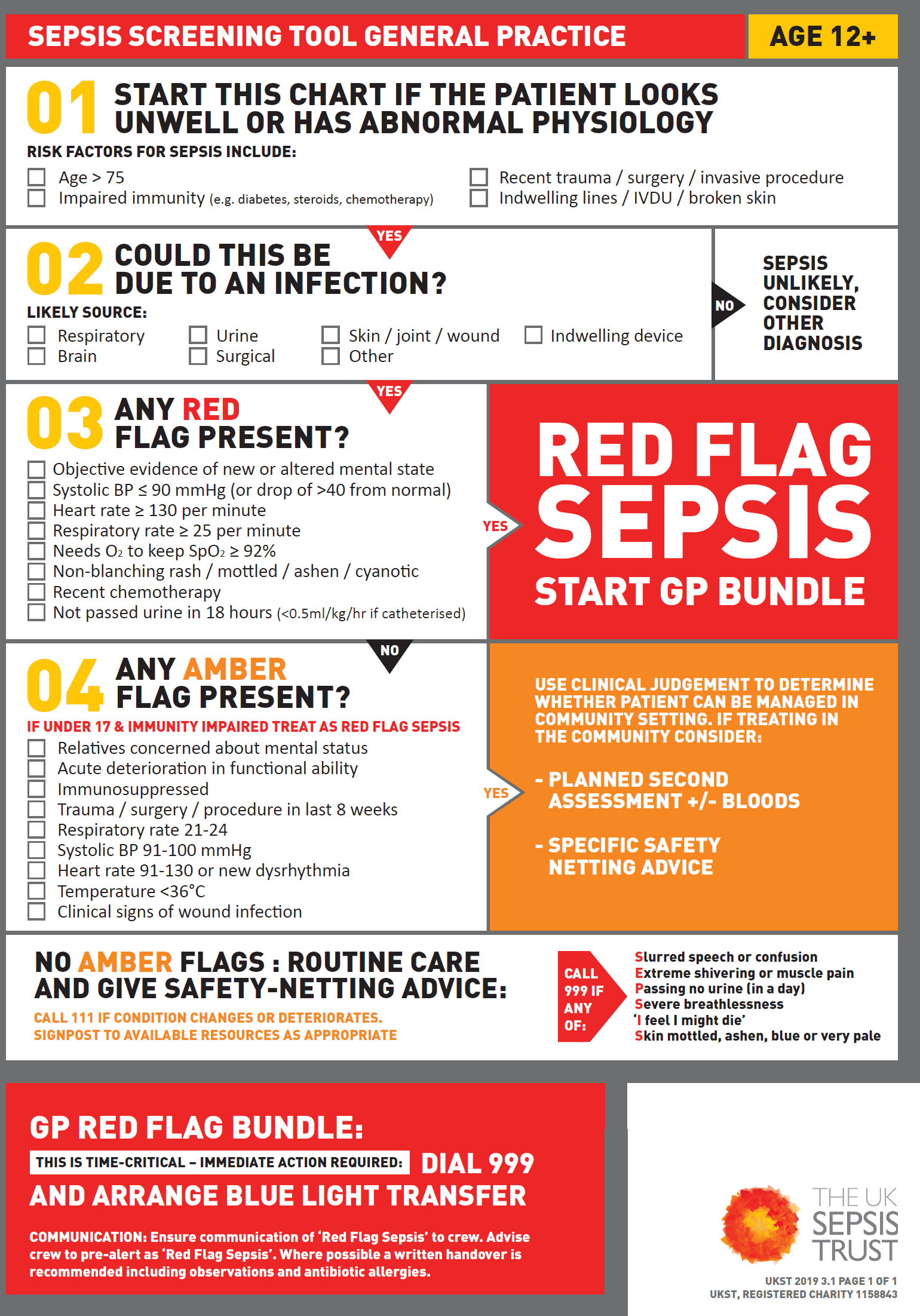Risk stratification tool for adults, children and young people aged 12 years and over with suspected sepsis
Risk stratification tool for adults, children and young people aged 12 years and over with suspected sepsis
Category | High risk criteria | Moderate to high risk criteria | Low risk criteria |
History | Objective evidence of new altered mental state | History from patient, friend or relative of new onset of altered behaviour or mental state History of acute deterioration of functional ability Impaired immune system (illness or drugs including oral steroids) Trauma, surgery or invasive procedures in the last 6 weeks | Normal behaviour |
Respiratory | Raised respiratory rate: 25 breaths per minute or more New need for oxygen (more than 40% FiO2) to maintain saturation more than 92% (or more than 88% in known chronic obstructive pulmonary disease) | Raised respiratory rate: 21-24 breaths per minute | No high risk or moderate to high risk criteria met |
Blood pressure | Systolic blood pressure 90 mmHg or less or systolic blood pressure more than 40 mmHg below normal | Systolic blood pressure 91-100 mmHg | No high risk or moderate to high risk criteria met |
Circulation and hydration | Raised heart rate: more than 130 beats per minute Not passed urine in previous 18 hours. For catheterised patients, passed less than 0.5 ml/kg of urine per hour | Raised heart rate: 91-130 beats per minute (for pregnant women 100-130 beats per minute) or new onset arrhythmia Not passed urine in the past 12-18 hours For catheterised patients, passed 0.5-1 ml/kg of urine per hour | No high risk or moderate to high risk criteria met |
Temperature | Tympanic temperature less than 36°C | ||
Skin | Mottled or ashen appearance Cyanosis of skin, lips or tongue Non-blanching rash of skin | Signs of potential infection, including redness, swelling or discharge at surgical site or breakdown of wound | No non-blanching rash |
Recognise that adults, children and young people aged 12 years and over with suspected sepsis and any of the symptoms or signs below are at high risk of severe illness or death from sepsis:
- objective evidence of new altered mental state
- respiratory rate of 25 breaths per minute or above, or new need for 40% oxygen or more to maintain oxygen saturation more than 92% (or more than 88% in known chronic obstructive pulmonary disease)
- raised heart rate: more than 130 beats per minute
- systolic blood pressure of 90 mmHg or less, or systolic blood pressure more than 40 mmHg below normal
- not passed urine in previous 18 hours (for catheterised patients, passed less than 0.5 ml/kg/hour)
- mottled or ashen appearance
- cyanosis of the skin, lips or tongue
- non-blanching rash of the skin
The UK Sepsis Trust have produced a form for evaluation of possible sepsis for use in primary care (2):

Reference:
- NICE. Suspected sepsis: recognition, diagnosis and early management. NICE guideline NG51. Published July 2016, last updated March 2024
- UK Sepsis Trust. The Sepsis Manual. General Practice recognition & management of Sepsis in adults and children and young people over 12 years. 7th edition. 2024
Related pages
Create an account to add page annotations
Annotations allow you to add information to this page that would be handy to have on hand during a consultation. E.g. a website or number. This information will always show when you visit this page.